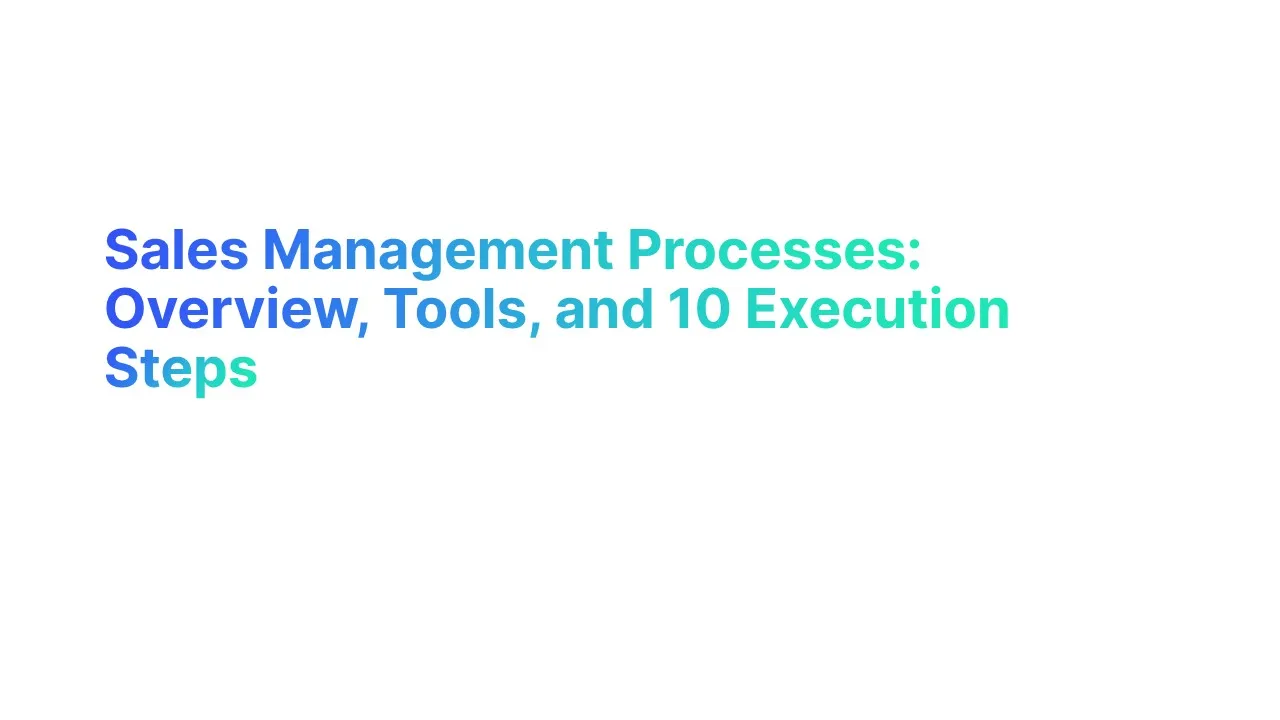What Is Sales Coaching?

Sales coaching is when a sales coach helps sales reps improve their skills and performance. The sales coach often gives tips, advice, and feedback to sales cycle length. To make sure the individual sales representatives and team can close more deals and be more successful.
Importance of Sales Coaching Effectiveness
When good sales coach and coaching is effective, it makes the sales team better at their jobs. This leads to higher sales and happier customers. Here's how best sales coaches say it is important:
1. Increased Job Satisfaction
- Sales coaching helps sales reps feel good about their work.
- Gallup says employees who get frequent feedback are 3.6 times more likely to be happy at work.
- Happy sales reps work better and stay longer.
2. Improved Sales Skills
- Effective coaching teaches sales reps important skills.
- They learn how to listen to customers, manage their time, and handle tough questions.
3. Higher Sales Success Rates
- Sales teams with good coaching close more deals.
- Structured sales coaching programs lead to a 28% increase in win rates, says CSO Insights.
The Role of Sales Leaders and Sales Managers in Coaching

Sales Leaders
Sales leaders guide the entire sales team. They make sales strategy, set clear goals for sales organization and provide direction for sales leadership. They also create effective sales coaching programs for sales representatives. These programs help sales reps learn important skills.
1.Sales Goals
- Sales leaders set clear and achievable goals for the team.
- This helps sales reps know what they need to do to succeed.
2.Create Coaching Programs
- Sales leaders design effective sales coaching programs.
- These programs teach sales reps how to sell better.
3.Use Data for Decisions
- Sales leaders use data to measure sales coaching effectiveness.
- They look at key performance indicators (KPIs) to see how well the team is doing.
Sales Managers
Sales managers and sales coaches work closely with sales reps. They provide one-on-one coaching and support to sales reps create other professionals. They help sales reps improve their performance and other sales professionals reach their targets.
1.Provide One-on-One Coaching
- Sales managers meet with sales reps to give personalized coaching.
- This helps sales reps improve specific skills and overcome challenges.
2.Monitor Performance
- Sales managers track the performance of their sales reps.
- They use performance metrics to identify areas for improvement.
3.Give Regular Feedback
- Sales managers give regular feedback to sales reps.
- This feedback helps sales reps know what they are doing well and what they need to work on.
How to build an Effective Sales Coaching Program

1. Set Clear Goals
- Set Objectives: Know what you want to achieve. Set clear and reachable goals for your sales team. For example, aim to increase sales by 15% in the next quarter.
- Track Improvement: Use key performance indicators (KPIs) to track how well your sales reps are doing. For instance, track the number of calls made, deals closed, and revenue generated.
2. Train Your Sales Managers
- Provide Training: Sales managers need to know how to coach effectively. Give them the tools and training they need.
- For example, offer workshops on coaching techniques and communication skills.
- Continuous Learning: Encourage sales managers to keep learning new coaching techniques. Provide access to online courses and industry conferences.
3. Develop a Structured Program
- Create a Plan: Outline the steps in your sales coaching program. Make sure it covers all important areas, like sales skills and techniques.
- For example, include modules on prospecting, closing deals, and customer relationship management.
- Regular Coaching Sessions: Schedule regular one-on-one meetings between sales managers and sales reps. For instance, set up weekly sessions to discuss progress and challenges.
4. Use Data-Driven Insights
- Analyze Performance: Look at sales data to see where improvements are needed. Use this data to guide your coaching sessions.
- For example, if a sales rep's closing rate is low, focus on improving their closing techniques.
- Adjust Strategies: Based on data, adjust your coaching techniques to better meet the needs of your sales team.
- For instance, if data shows that sales reps struggle with handling objections, provide targeted training on this skill.
5. Provide Feedback and Support
- Give Regular Feedback: Sales reps need to know what they’re doing well and what they can improve. Give them feedback regularly.
- For example, after a sales call, provide immediate feedback on what went well and what could be improved.
- Support and Encourage: Be supportive. Encourage your sales reps to keep improving and trying new techniques.
- For instance, celebrate small successes and milestones to keep morale high.
Best Practices for Sales Coaching

1. Set Clear Goals and Expectations for Your Sales Team
Setting clear goals helps sales reps know what they need to achieve.
Why it matters?
Clear goals provide direction and help the sales teams and reps focus on what’s important.
How to do it:
- Identify Targets: Know what you want to achieve. For example, aim to increase sales by 10% in the next three months.
- Measure Progress: Use key performance indicators (KPIs) to see how well your sales reps are doing. Track things like the number of calls made, deals closed, and revenue earned.
- Communicate Clearly: Make sure your sales team knows the goals. Explain what is expected of them in simple words.
Example: Sarah’s sales manager told her the goal was to close five deals this month. Sarah knew what to do and worked hard to reach that goal.
2. Personalize Coaching Sessions for Sales Reps
Personalizing good sales coaching sessions means tailoring your sales approach and sales coaching styles, to each sales rep’s needs.
Why it matters?
Each sales rep is different and has unique strengths and weaknesses.
How to do it:
- Understand Individual Needs: Learn about each sales rep’s strengths and weaknesses. For example, John is great at finding leads but needs help closing deals.
- Tailor Your Coaching: Adjust your coaching style to fit each sales rep. Give specific advice and strategies that will help them improve.
- Use Real Examples: Use real sales calls and situations to coach. This makes the learning more practical and relatable.
Example: Maria struggled with handling objections. Her manager listened to her calls and gave her specific tips on how to respond better. Maria’s confidence and skills improved quickly.
3. Implement Regular Check-Ins
Regular check-ins help track progress and address any issues promptly.
Why it matters?
Consistent feedback and support keep sales reps on track and motivated.
How to do it:
- Schedule Consistent Meetings: Set up regular one-on-one meetings. For example, meet with each sales rep weekly to discuss progress and challenges.
- Provide Feedback: Give constructive feedback during these check-ins. Praise what they are doing well and suggest areas for improvement.
- Set Short-Term Goals: In each meeting, set small, achievable goals for the next week. This helps sales reps stay focused and motivated.
Example: Every Friday, Tom meets with his sales manager. They talk about his successes and challenges from the week. Tom feels supported and knows exactly what to work on next.
4. Foster a Growth Mindset
A growth mindset means believing that skills can be developed through hard work and learning.
Why it matters?
Encouraging a growth mindset helps sales reps stay motivated and open to learning new things. It makes them more resilient to challenges and professional development opportunities.
How to do it:
- Encourage Learning: Remind your sales reps that they can improve with effort and practice. For example, tell them that making mistakes is a part of learning.
- Celebrate Effort: Recognize and reward hard work, not just results. This shows that trying hard is important.
- Provide Resources: Give your sales reps access to books, courses, and other learning materials. For example, suggest reading a book about sales techniques or taking an online course.
Example: Jane's sales manager noticed she was struggling with new sales software. Instead of criticizing her, he encouraged her to keep practicing and provided a tutorial. Jane kept trying and eventually became very good at using the software.
5. Focus on Skill Development
Skill development means helping sales reps improve specific abilities needed for their job.
Why it matters?
Improving skills like communication, time management, and product knowledge makes sales reps more effective and confident.
How to do it:
- Identify Key Skills: Determine which skills are most important for your sales team. For example, focus on improving communication and closing techniques.
- Provide Training: Offer training sessions, workshops, and coaching sessions to help sales reps develop these skills. Use real-life examples and role-playing exercises.
- Track Progress: Monitor how your sales reps are improving their skills. Use feedback and performance metrics to measure their development.
Example: Mark’s sales manager saw that he needed to improve his presentation skills. She arranged for Mark to attend a workshop on effective presentations. After the workshop, Mark practiced his new skills in coaching sessions and became much better at presenting to clients.
Sales Coaching Techniques

Sales coaching effectiveness is key to improving the performance of your sales team. Here are some effective sales coaching tips, strategies and techniques to help you succeed.
1. Live Call Coaching
Live call coaching involves listening to sales reps during their calls with customers and providing immediate feedback.
Why: This technique helps sales reps improve their skills in real-time and learn how to handle different situations effectively.
How:
- Listen to Calls: Sit with your sales reps during their calls. Pay attention to how they interact with customers.
- Give Instant Feedback: Right after the call, provide feedback on what they did well and what they can improve.
- Role-Play Scenarios: Practice common call scenarios with your sales reps to help them get better.
According to the Sales Management Association, companies that use live call coaching see a 30% increase in sales win rates. Additionally, a study by Gong.io found that sales reps who receive live coaching close 20% more deals than those who don’t.
2. Using Call Data for Coaching
Using call data involves analyzing recorded sales calls. To identify any areas of improvement that needs to analyze sales calls.
Why: This technique provides valuable insights into sales reps' performance and helps in tracking their progress over time.
How:
- Record Calls: Ensure that all sales calls are recorded for review.
- Analyze Performance: Listen to the recordings and look for patterns in sales reps' behavior. Identify what works well and what doesn’t.
- Share Findings: Discuss the findings with your sales reps and provide specific advice on how to improve.
Research by InsideSales.com shows that using call recordings for coaching can improve sales rep performance by up to 33%. Furthermore, sales reps who receive feedback based on call data are 12% more likely to meet their quotas.
3. Focused Sales Techniques Training
Focused sales techniques training involves teaching sales reps specific and effective sales strategies, processes and skills needed for their job.
Why: It helps sales reps develop essential skills like closing deals, handling objections, and building rapport with customers.
How:
- Identify Key Skills: Determine which skills are crucial for your sales team’s success. Focus on areas like communication, negotiation, and product knowledge.
- Provide Training Sessions: Organize workshops and training sessions to teach these skills. Use practical examples and role-playing exercises.
- Monitor Progress: Track your sales reps’ improvement in these areas. Provide continuous feedback and support.
According to the Aberdeen Group, sales reps who receive focused sales training, from top sales coaches, see a 24% improvement in sales performance. Moreover, companies that invest in effective sales coach training programs experience a 50% higher net sales per employee.
4. Practice Sales Scenario
Practicing successful, sales coaching techniques and scenarios means role-playing different, sales coaching, conversations and situations with your sales reps.
Why: This helps sales reps prepare for real-life situations and improves their confidence.
How:
- Create Scenarios: Think of common situations your sales team might face. For example, handling objections or closing a deal.
- Role-Play: Have your sales reps act out these scenarios. One person can be the customer, and the other can be the sales rep.
- Provide Feedback: After the role-play, give feedback on what was done well and what can be improved.
A study by Training Industry found that role-playing can improve sales performance by 40%. Additionally, sales reps who practice scenarios are 30% more likely to close deals successfully.
5. Giving Balanced Feedback
Balanced feedback means giving both positive comments and constructive criticism.
Why: This helps sales reps understand their strengths and areas for improvement, making them more effective.
How:
- Start with Positives: Begin by highlighting what the sales rep did well. This boosts their confidence.
- Address Areas for Improvement: Gently point out where they can improve. Be specific and provide examples.
- Offer Solutions: Give practical advice on how to improve. This helps the sales rep know exactly what to do next.
According to Gallup, employees who receive balanced feedback are 4.6 times more likely to feel motivated and engaged. Moreover, companies that use balanced feedback see a 14.9% lower turnover rate.
How to Use Tools for Sales Coaching
1. Live Call Monitoring Tools
Live call monitoring tools help sales managers listen to sales calls in real-time and provide feedback.
Why it matters?
These tools allow sales managers to understand how sales reps interact with customers and offer immediate coaching to improve their skills.
Gong

Record and Analyze Calls: Gong records sales calls and uses AI to analyze them. It looks at patterns and provides insights into what works and what doesn’t.
Real-Time Feedback: Sales managers can listen to calls live and give instant feedback. This helps sales reps improve right away.
Track Performance: Gong tracks the performance of most sales managers and reps over time. This helps sales managers see progress and see areas of improvement that need more attention.
Chorus.ai
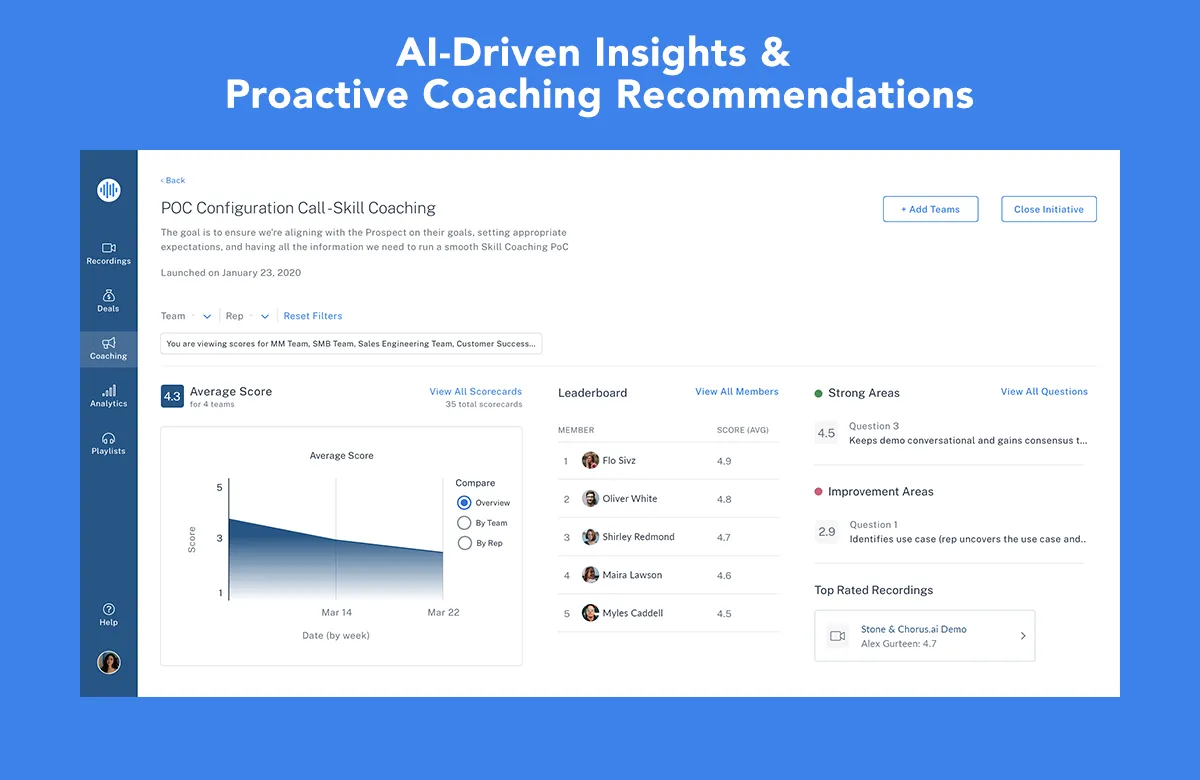
Record Calls: Like Gong, Chorus.ai records sales calls. It also uses AI to analyze the conversations.
Identify Patterns: Chorus.ai identifies patterns in successful sales calls. It looks at things like talk-to-listen ratios and key phrases that lead to sales call success.
Provide Coaching Tips: Based on the analysis of reps sales performance, Chorus.ai offers coaching tips to help sales reps improve their performance unlike most sales coaching.
2. Learning Management Systems (LMS)
Learning Management Systems (LMS) are platforms that help you manage and deliver training programs to your sales reps.
Why it matters?
LMS tools make sales coaching important by organizing training sessions, tracking progress, and ensuring all sales reps receive consistent coaching.
LearnUpon
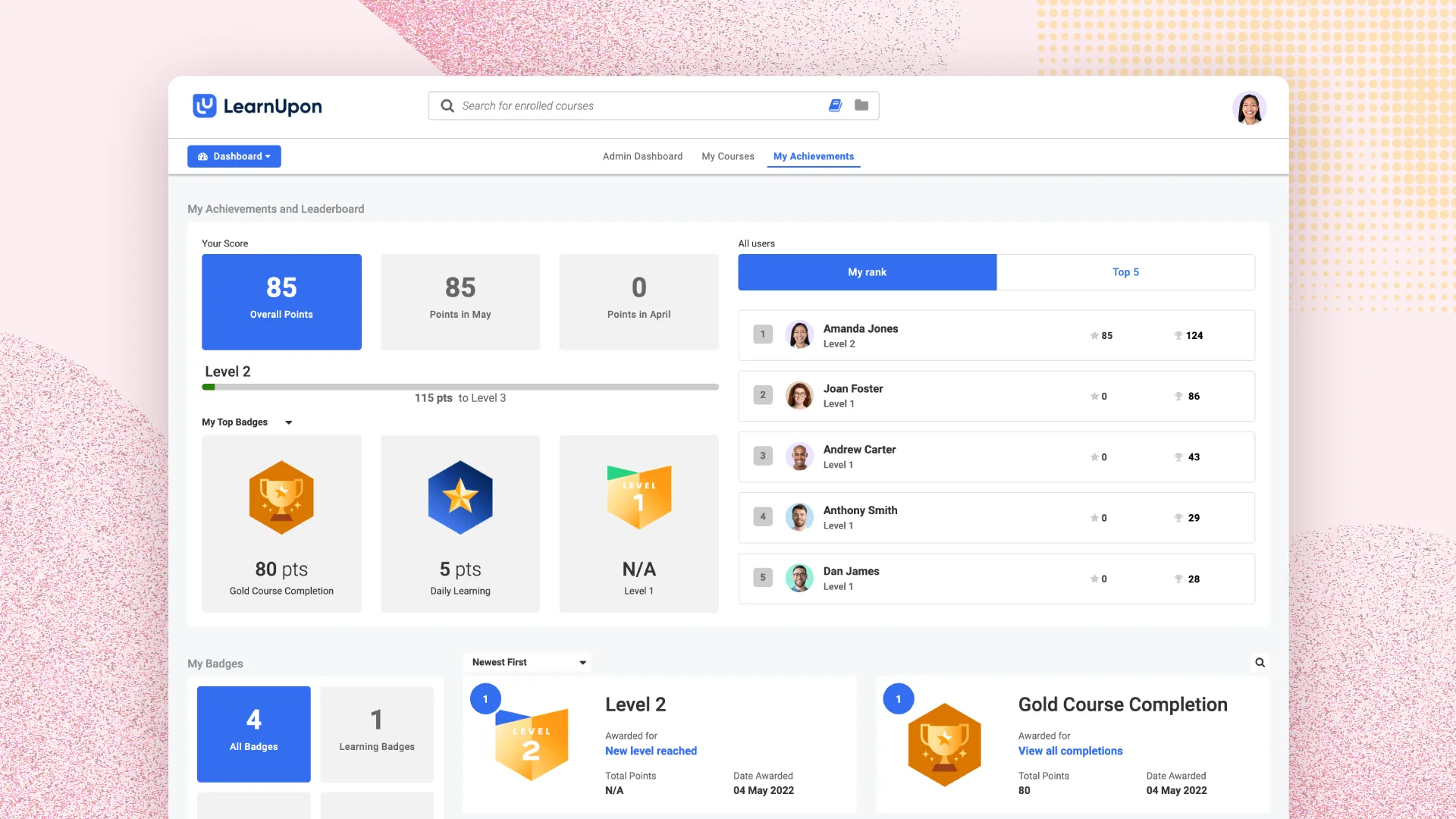
Organize Training Content: LearnUpon lets you create and organize training materials. You can upload videos, documents, and quizzes.
Track Progress: It tracks how well your sales reps are doing in their training. You can see who has completed courses and who needs more help.
Certifications: LearnUpon offers certifications for completed courses. This motivates sales reps to finish their training.
TalentLMS
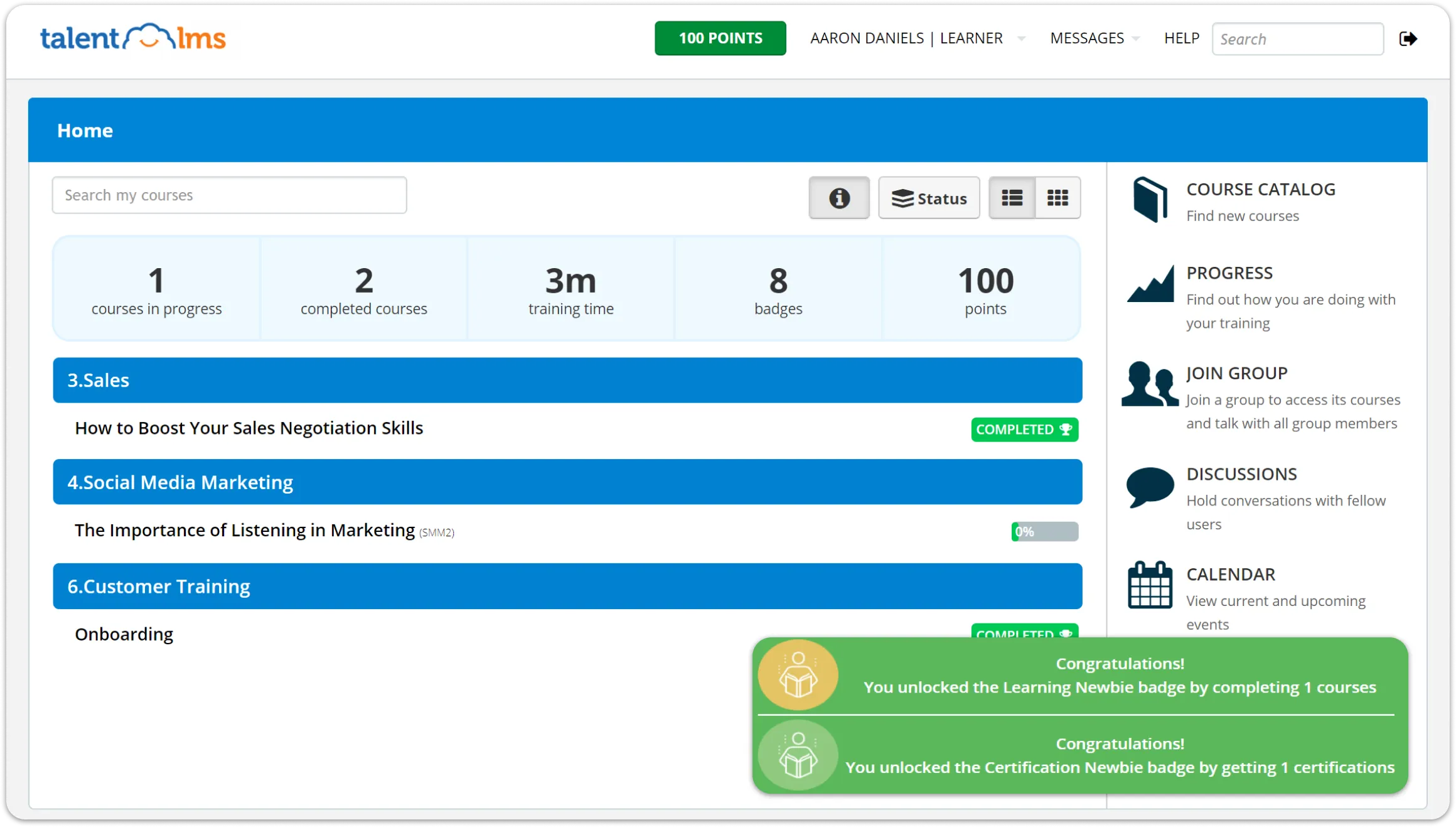
Easy to Use: TalentLMS is user-friendly. Sales reps can access training materials anytime, anywhere.
Customizable Courses: You can create custom courses that fit the specific needs of your sales team members. This ensures that the training is relevant and effective.
Gamification: TalentLMS includes gamification features like badges and points. This makes learning fun and engaging for sales reps.
3. Feedback and Collaboration Platforms
Feedback and collaboration platforms help sales teams communicate, share feedback, and work together more effectively.
Why it matters?
These platforms make it easier for sales managers to provide real-time feedback for their sales teams and reps to collaborate and improve.
Slack

Real-Time Communication: Slack allows instant messaging within the same sales organization or the entire team together. Sales reps can ask questions and get quick answers from their managers or teammates.
Channels for Topics: You can create different channels for various topics. For example, one channel can be for product questions, another for various sales strategies and techniques.
Feedback Integration: Managers can give feedback directly in Slack. They can share praise or suggest improvements immediately after a sales meeting or call.
Microsoft Teams

Seamless Collaboration: Microsoft Teams integrates with other Microsoft products like Word, Excel, and PowerPoint. This makes it easy for sales reps to share documents and collaborate on presentations.
Video Meetings: Sales managers can hold video meetings for sales coaching tips and sessions. This helps in providing face-to-face feedback on sales process even if the team is remote.
File Sharing: Teams allows easy sharing of files and resources. Sales reps can access training materials, scripts, and other important documents anytime.
4. Performance Tracking and Goal Setting Tools
Performance tracking and goal-setting tools help sales managers monitor their team's progress and set clear goals.
Why it matters?
These tools ensure that sales reps stay on track and continuously improve their performance.
Ambition
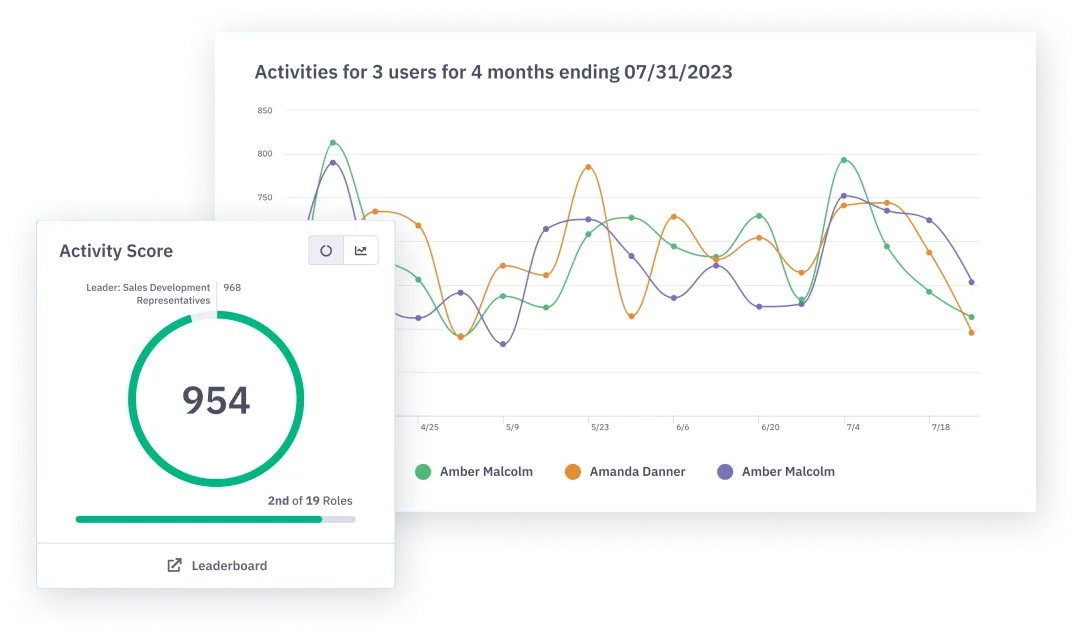
Track Performance: Ambition lets you track key performance indicators (KPIs) for your sales team. You can see how each sales rep is performing in real-time.
Set Goals: Sales managers can set specific goals for their sales reps. Ambition helps track the progress towards these goals.
Motivate with Competitions: Ambition includes features like leaderboards and competitions. This motivates sales reps to perform better and reach their targets.
Hoopla
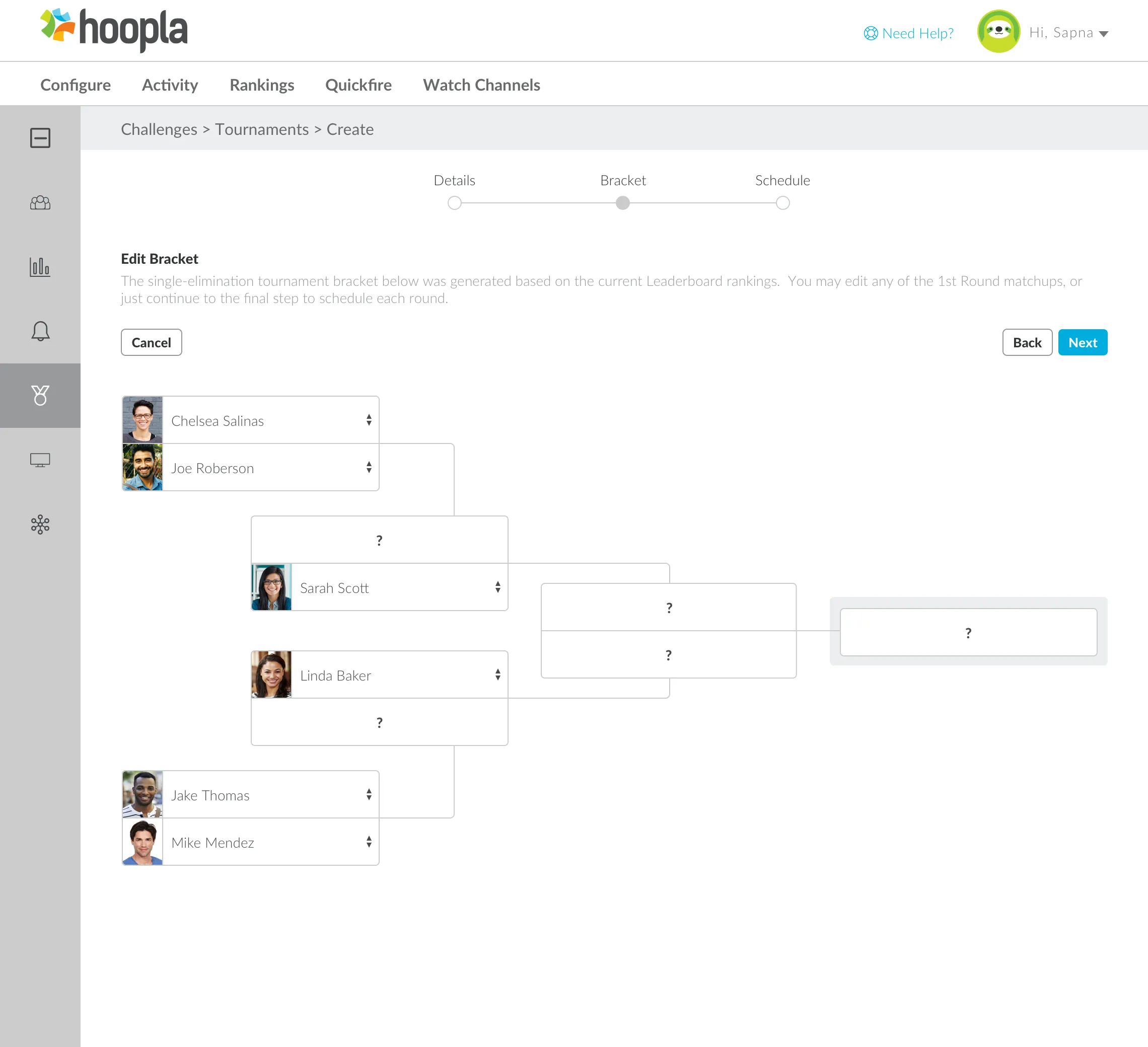
Monitor Progress: Hoopla helps sales managers monitor the progress of their sales and team members. You can track sales calls, see team members' meetings, and other activities.
Set Achievable Goals: With Hoopla, you can set realistic and achievable goals for your sales reps. This helps in keeping the entire team focused and motivated.
Celebrate Success: Hoopla allows you to celebrate the achievements of your sales reps. This positive reinforcement improves morale and encourages them to keep improving.
5. Customer Relationship Management (CRM) Systems
CRM systems help sales managers keep track of customer interactions, manage sales pipelines, and store important customer data.
Why it matters?
These tools ensure that sales reps have all the information they need to manage customer relationships effectively and improve their sales performance.
Salesforce

Manage Customer Data: Salesforce allows you to store all customer information in one place. This makes it easy for sales reps to access and update customer details.
Track Sales Activities: Sales managers can track the activities of their sales reps. This includes calls, meetings, and emails.
Automate Tasks: Salesforce can automate repetitive tasks. This saves time for sales reps and helps them focus on selling.
Zoho CRM

Easy to Use: Zoho CRM is user-friendly and easy to set up. Sales reps can quickly learn how to use it.
Integrate with Other Tools: Zoho CRM can integrate with other tools like email, social media, and accounting software. This helps sales reps manage everything in one place.
Customizable Dashboards: Sales managers can create dashboards that show important metrics. This helps them see how their sales team is performing at a glance.
Conclusion
Sales coaching effectiveness is key to improving the performance of your sales team. By using the right tools and techniques, good sales coaches, and managers can help sales reps achieve their goals.
CRM systems like Salesforce and Zoho CRM make it easier to manage customer relationships and track sales activities.
Consistent, sales process, sales coaching plan,, and feedback leads to better sales performance. By integrating these tools, effective sales coaches and managers can ensure their team is always improving and meeting targets. This results in a more successful and motivated sales team.
By using data-driven approaches and setting clear goals, great sales coach can significantly enhance sales training and coaching. Keep coaching, stay motivated, and watch your effective sales coach and training team thrive.





.png)

